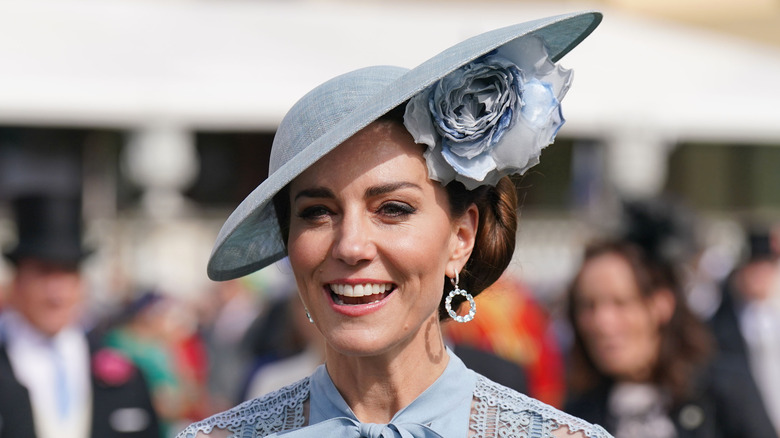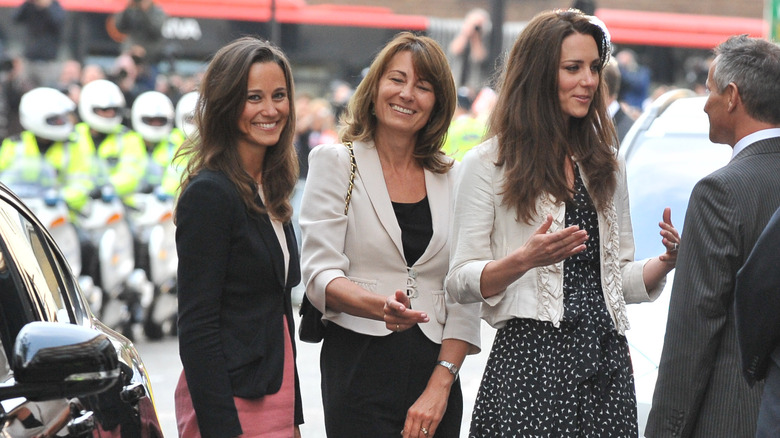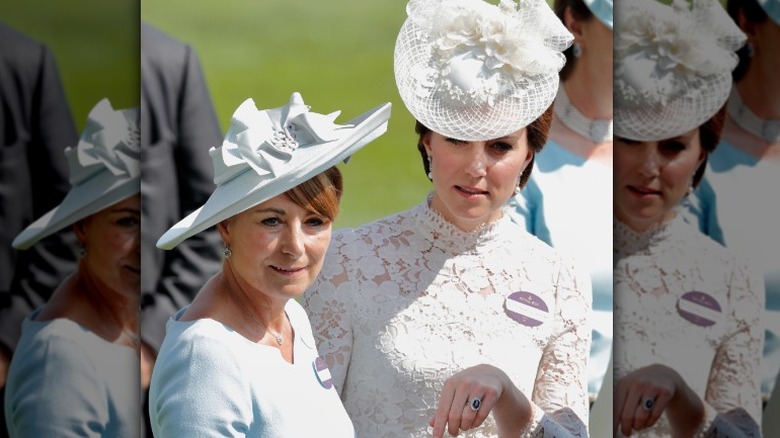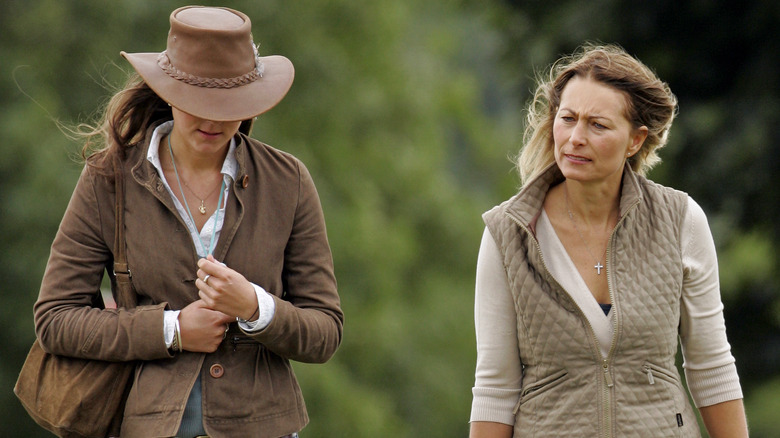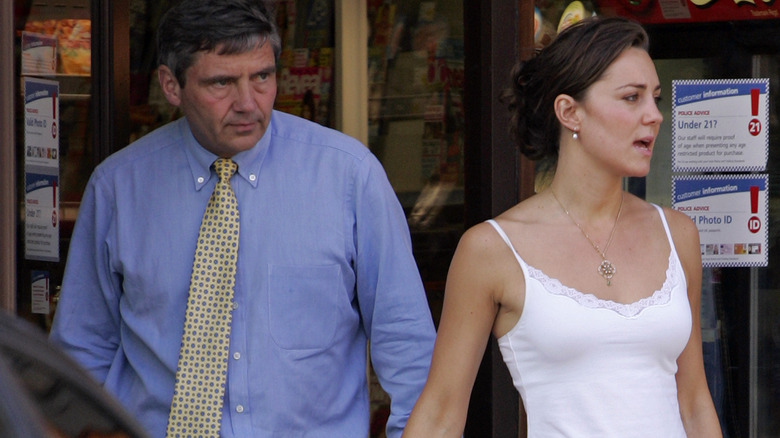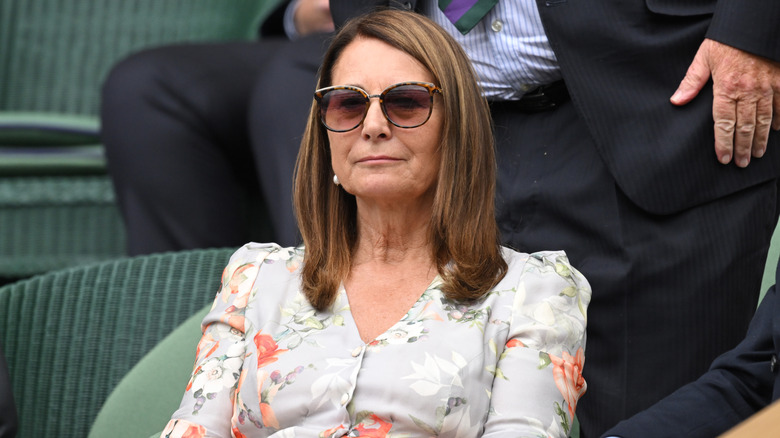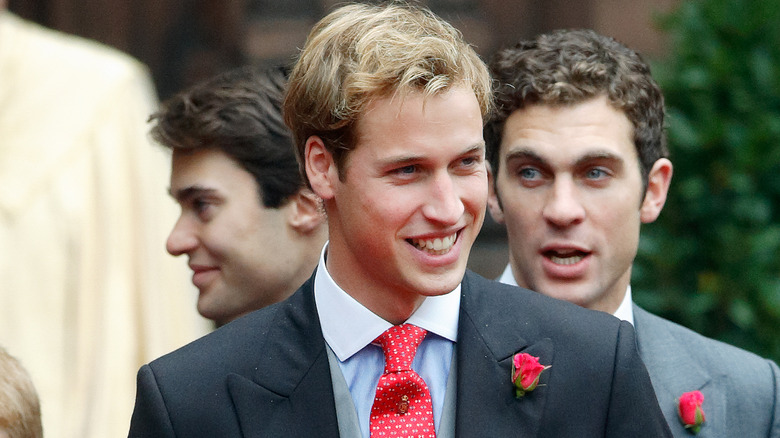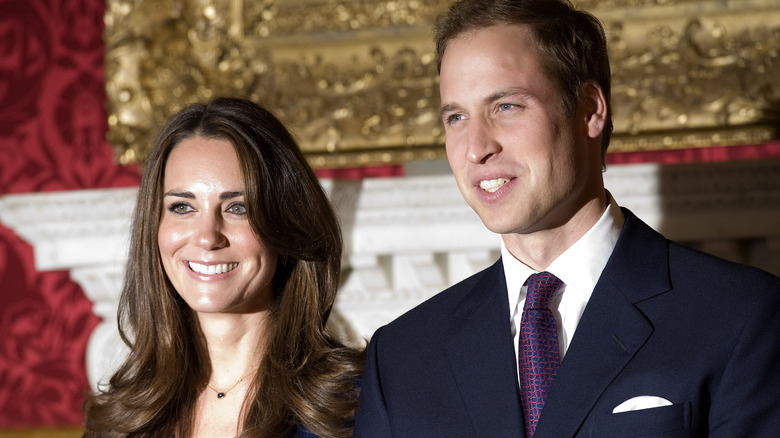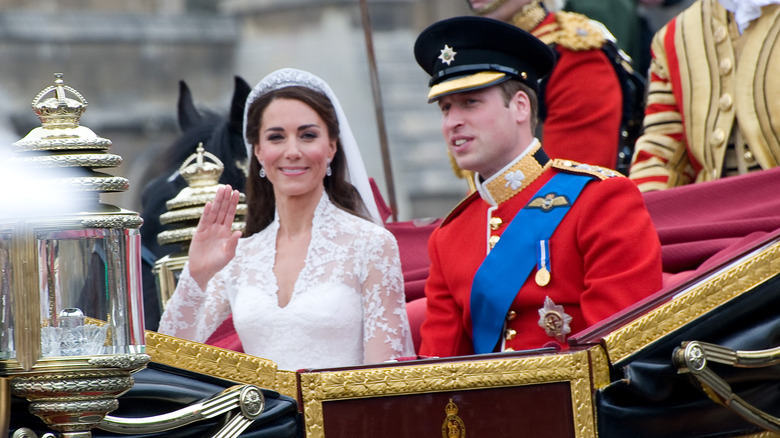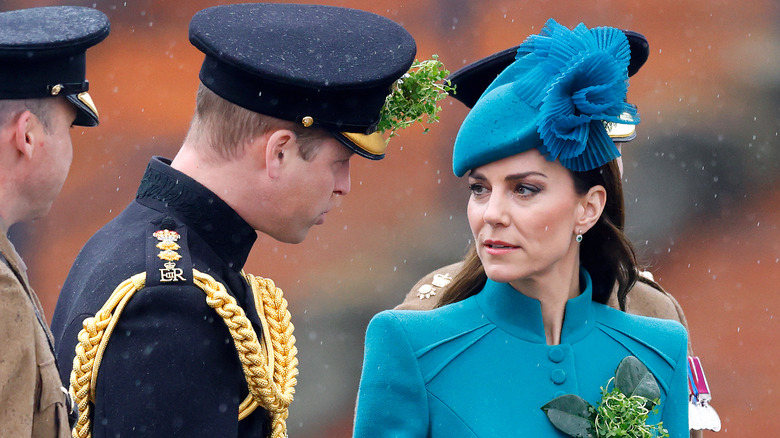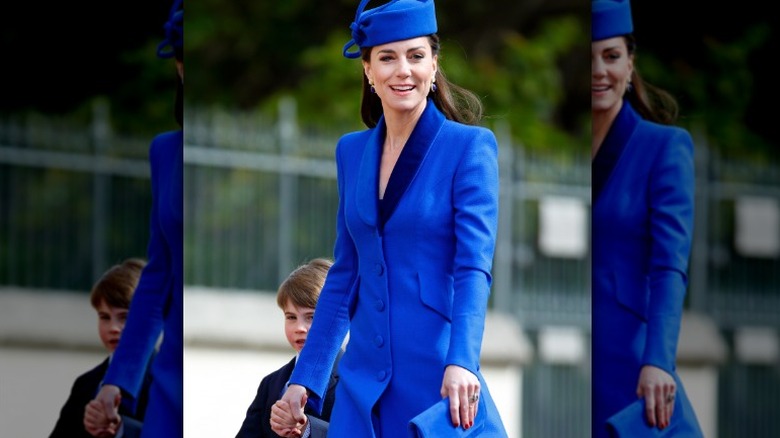Times Kate Middleton Experienced Classism
Even as a "commoner," Princess Catherine grew up wealthy. Her parents, Michael and Carole Middleton, founded a wildly successful party company, which they dubbed Party Pieces. The business was, indeed, so lucrative that the Middletons were able to raise Catherine and her two siblings in a home that was valued at around £1.5 million (via Hello!). They were also able to educate their children at pricey prep schools. Catherine, for one, studied at the exclusive Marlborough College, where she was the captain of the field hockey team.
By British standards, however, the Middletons were considered middle class, due to their more humble roots. In the U.K., class is not defined by financial success but by lineage. And, as the British press was quick to point out, Catherine's family did not have ties to dukes or lords. On the contrary, the Princess of Wales is a direct descendant of James Harrison — a coal miner who lived in the 1700s. For many, in Britain's upper crust, this meant that Catherine and her parents belong to a different category of people — one which they wholeheartedly rejected. Indeed, many aristocrats have even opposed the marriage of a middle-class woman, like Catherine, to the likes of Prince William.
Because of this mentality, Catherine has faced much classist commentary over the years. From the rude nickname that she was called in school to the scrutiny she suffered over her nail polish, these are the times that Catherine experienced classism.
Princess Catherine's family was nicknamed the 'en masse Middletons'
Although the Middletons were financially successful, the British elite would not accept the family into its folds. This was most apparent at social events, where members of the upper crust would snidely call Princess Catherine's family members degrading nicknames behind their backs. Royal correspondent, Katie Nicholl, revealed in an episode of Vanity Fair's podcast, "Dynasty" (via Berkshire Live), the family as a whole was often referred to as the "en masse Middletons." In French, this label translates loosely to "the Middletons of the masses."
According to Nicholl, this clear jab at the Middleton bloodline was often used to mock the family for putting effort into social gatherings. At picnics, in particular, Carole Middleton was said to dedicate a tremendous amount of energy to ensuring the quality of her spread. As Nicholl explained in the "Dynasty" episode: "Carole would take great pride in her picnic. She would have the finest spread on beautiful linen tablecloths with silver cutlery and everything else." In contrast, Nicholl shared, many of the aristocrats who turned up to these events would bring "moth-eaten blankets that are full of holes and some sort of oddly cobbled together a picnic with hardboiled eggs rather than M&S finest."
Thus, these classist aristocrats would mock "en masse" Carole for putting too much effort into her spreads. Meanwhile, they themselves were the "sort of so posh [they] don't really have to bother making an effort — but the Middletons did."
Princess Catherine's mother was mocked for her career as a flight attendant
Before Michael and Carole Middleton were the co-owners of a successful business, the couple worked in the airline industry. Although Michael trained as a pilot, he ultimately chose to work for British Airways as a flight dispatcher. Meanwhile, Carole was working for the same airline as a flight attendant. The two eventually crossed paths and hit it off. By the summer of 1980, they were married. Seven years later, they founded Party Pieces.
Everyday folks may admire this story as an example of hard work paying off, but members of the British elite looked down on it. From an upper-crust point of view, even the Middletons' business acumen was considered lowly. Royal author, Tom Quinn, explained in the documentary "William & Kate: Too Good To Be True?" (via YouTube), that some aristocrats even considered Princess Catherine "tainted by association with this family who, you know, sold party hats. What a disgrace!"
If the aristocracy viewed Party Pieces as disgraceful, however, they were no more accepting of the Middletons' ties to the airline industry. In the Vanity Fair podcast, "Dynasty" (via Berkshire Live), royal correspondent, Katie Nicholl, revealed that Prince William's elite friends sometimes mocked Carole's old job. This was especially apparent when they spotted Catherine at parties and would sneer "doors to manual" — a phrase often used in U.K. flights. According to Nicholl, "It's a bit of a derogatory reference to Carole's career as an air hostess."
Carole Middleton was teased for speaking like a commoner
In British society, speaking with a certain accent still matters to traditionalists. Of course, this trend is changing. As reported in a 2010 piece by the Associated Press (via The Seattle Times): "Accent is still a key class signifier, although times have changed since those of humble origin had to shed all hints of working-class or regional origins if they hoped to rise in the world." Even as Britain has migrated away from these verbal distinctions, however, the royal family and some old-timey aristocrats continue to hold onto them. These so-called blue bloods speak using "upper received pronunciation" (upper R.P.) to designate their status.
Naturally, given Carole Middleton's middle-class background, she does not speak using an upper R.P. accent. What's more, the mother of three was not raised in such a way that she would be expected to follow royal protocol. Thus, many of Carole's upper-class acquaintances have been known to criticize the way she speaks. In an anonymous conversation with the Daily Mail, one palace insider jeered that Carole "is pushy, rather twee and incredibly middle-class. She uses words such as 'pleased to meet you,' 'toilet' and 'pardon.'" This description clearly insinuates that Carole is somehow "less than" because she does not speak the way that aristocrats do. Indeed, the Middletons have been targeted time and time again by classist insults that seek to put them down for their lack of lordly lineage.
Princess Catherine and her parents were labeled social climbers for mingling with Prince William
Throughout Princess Catherine and Prince William's courtship, many British aristocrats opposed their romance — lamentably, Catherine's middle-class status motivated these opinions. Speaking in the documentary, "William & Kate: Too Good To Be True?" (via YouTube), royal expert, Tom Quinn, shared: "The aristocrats, the old Etonian advisors, they saw Kate's background, the fact that she worked for a company — for her parents' company — the old-fashioned part of the palace didn't like it at all."
Perhaps, as a result of this classist mentality, Catherine's relationship with her future husband was often described — by both acquaintances and the media — as a desperate grab for social capital. Likewise, the whole Middleton family was frequently portrayed as a bunch of conniving social climbers. In that spirit, one of the family's neighbors told the Mirror: "Kate's a lovely girl but her parents are social climbers, ghastly people ... They've only mixed with people who can help them climb the social ladder and were determined Kate would do the same ... That's why they were thrilled when Kate started seeing William."
Other voices even whispered that Carole Middleton arranged Catherine's attempt at social ascension. One acquaintance told the Daily Mail: "The irony is that Carole has been so busy pushing her daughter forward and doing her best to groom her for royalty that she's rather missed the point that she might not fit in herself."
Carole Middleton was attacked by the press for chewing gum
In December 2006, Prince William graduated from The Royal Military Academy Sandhurst. Charmingly, the prince included Princess Catherine and her family in the ceremony. Speaking in the documentary, "William & Kate: Too Good To Be True?" (via YouTube), royal expert, Rebecca English, recalled that Sandhurst graduation. "I specifically remember William's passing out parade. We hadn't expected Kate and her family to turn up ... And, suddenly, out of the corner of our eye, we saw Kate and her mother and father being ushered down to the front of the seating."
While this occasion was important for Prince William, Carole Middleton accidentally took the front stage by chewing gum during the ceremony. This breach of royal etiquette set off a number of headlines questioning whether the Middletons were classy enough to become royal in-laws. The Daily Mail reported that Carole was "subjected to highfalutin tutting after chewing gum ... at Prince William's Sandhurst passing-out parade. Nice girls do not chew gum during passing-out parades."
When William and Catherine broke up, just a few months later, some blamed the gum chewing for the relationship's demise. "This country is driven by the class system," royal correspondent, James Whitaker, told Reuters (via Toronto Star). "The problem was the mother. I don't think it was Kate ... Nobody could believe it when she chewed gum throughout."
Prince William and Princess Catherine's 2007 break-up was attributed to class differences
In April 2007, Prince William and Princess Catherine decided to split up. At the time, the public viewed the separation as a permanent one. And, unfortunately, the media blamed Catherine's middle-class status for the breakup. As royal expert, Richard Kay, explained in the documentary, "William & Kate: Too Good To Be True?" (via YouTube), "There was some rather cruel and unkind commentary about the inadequacy, if you like, of the Middleton family as a sort of future royal in-laws."
Sadly, the tabloid response to the break-up was particularly brutal toward Carole Middleton, with several publications attributing the split to her middle-class background. One anonymous palace source apparently told the Daily Mail: "The queen was fond of Kate and liked her father, but let's just say there was a feeling that Mrs. Middleton was not right or acceptable." In similarly brutal fashion, royal correspondent, James Whitaker, told Reuters: "When she met the queen, Carole Middleton said 'Pleased to meet you' and asked where the toilet was" (via Toronto Star). Separate reports have indicated that Queen Elizabeth II did not like to utter the word "toilet."
In response to the British take on William and Catherine's break-up, the Los Angeles Times published a piece that posited: "The Middleton affair has reminded Britain, though the rest of the world may not have needed reminding, that it has not achieved its aspirations of a classless society."
Tabloids suggested Prince William marry a real princess instead
Shortly after Prince William and Princess Catherine parted ways in 2007, the media began debating over who would be a "worthy" replacement. Interestingly, some Brits believed that William would be better off dating someone of his own social class. In an opinion piece published in the Mirror, royal correspondent, James Whitaker, reiterated his opinion that Catherine was too middle class for William. "I am on record as saying that Kate, delightful as she might be, was not from suitable stock to be our future Queen." The commentator then went on to opine, "William needs to look towards the aristocracy for a suitable bride. Not out of snobbery but common sense."
As if the blatant classism in these statements was not offensive enough, the columnist went on to posit that William should consider marrying a European princess. Of course, Whitaker recognized that these unions have not been very common, historically speaking. After all, the British monarch is expected to be the Head of the Church of England, and most Southern European royal families had strong ties to the Catholic Church. However, in Whitaker's view, "The Queen has already said she would not object to girls, if first-born, succeeding ... So why should she object to marrying Catholics?"
Interestingly, others shared Whitaker's view. "There are those purists who say he should marry a princess from one of the European royal families," William Bortrick, a royal editor, told the Associated Press (via Seattle Times).
Sources implied that Prince William disliked the class wars being waged against Princess Catherine
When the international press cast his breakup as a class issue, Prince William was said to be none too pleased. As tabloids published classist portrayals of the Middleton family, one of William's aides spoke to the Daily Mail to try to clear things up. In this interview, the source shared: "The reports, which allege that the palace was horrified at Mrs. Middleton's so-called behavior simply aren't true and are really quite offensive to all those concerned." Interestingly, the aide tried their best to portray the separation as any old college breakup, stating: "The simple fact of the matter is that two young people who met at university have unfortunately drifted apart after four years. The breakup is completely amicable and both Kate and William are still very supportive of each other."
Unfortunately, these statements did little to quell the media storm surrounding Prince William and Princess Catherine's breakup. However, they might have helped William realize that he wanted to get back together with Catherine. Speaking in the documentary, "William & Kate: Too Good To Be True?" (via YouTube), royal expert, Richard Kay, expressed his opinion on the media's classist interpretation of the breakup. "It was very snobbish. If anything, it possibly propelled William back into Kate's arms — because, it was a fairly short break." Indeed, just two months after they separated, William and Catherine were spotted kissing at a Moulin Rouge theme party.
Before marrying Prince William, Princess Catherine had to learn how to act more royal
The British upper class made no secret of its opposition to Prince William's courtship of Princess Catherine. However, over time, Catherine managed to secure her place in the palace. Indeed, as articulated in the documentary "William & Kate: Too Good To Be True?" (via YouTube), "Kate was quick to charm William's family, but the aristocratic circles that surround the palace took longer to win over."
In order to charm the elite, Catherine had to undergo a personal transformation. No longer could she dress in the casual wear of a typical middle-class girl; instead, she was expected to display a more refined taste in fashion. In the same documentary, royal expert, Tom Quinn, relayed: "Her clothing almost began to reflect what people saw in her character. A kind of restraint. A kind of modesty almost. And I think that did come about because William and Kate were moving towards the point where they would announce their engagement. And I think it was Kate starting to behave in ways which would be seen as more appropriate for a future queen" (via YouTube).
Interestingly, Catherine did not only change her attire — she also changed her accent. Speaking to OK!, royal expert, Duncan Larcombe, noted: "It's as though her accent and the way she carefully speaks and pronounces her words have become more regal over the years and morphed into what we see now."
Even after Prince William and Princess Catherine got married, their relationship was attacked for class reasons
On April 29, 2011, Princess William and Princess Catherine tied the knot in a fairy tale wedding at Westminster Abbey. By the end of the ceremony, Catherine was not only William's wife but also a veritable middle-class princess. The union was, indeed, historic. As one headline in Town & Country later declared: "How Duchess Kate imploded the class system and gave rise to a new kind of Brit."
Although most Brits welcomed the idea of a princess who descended from coal miners, not everyone saw things that way. Certain classist voices continued to question William's decision, even after he got married. Just following the royal wedding, royal commentator, James Whitaker, published a piece in the Mirror that reiterated his opinion that William and Catherine were ill-matched. The correspondent wrote, rather brutally: "My biggest concern for Kate is her relatively humble background which, generously, is described as middle class. It certainly isn't upper-middle class." Whitaker then went on to hint that Catherine's background would preclude her from being a good queen. "I'm not against the middle classes as such but I do query — I always have done — whether she has the background and breeding to become Queen one day."
Princess Catherine was criticized for her nail polish
Over the years, Princess Catherine has done her best to follow royal protocol. However, as demonstrated by her marriage to the heir to the throne, times are changing. On Easter Sunday 2023, the princess demonstrated her fashion-forward approach to being royal by painting her nails bright red. What's more, Catherine wore a cheery blue ensemble with her cherry-colored nail polish — creating a bold, visual effect.
Although something as benign as nail polish might not seem like a big deal, Catherine's Easter manicure parted with the decades-long royal rule that princesses should only wear neutral shades. As royal protocol consultant, William Hanson, told The Sun, nail polish "needs to be skin-colored so hot red and bright pink, for example, are not correct, especially for official occasions and particularly during mourning." Instead, royal women are apparently expected to paint their nails "either translucent or dusky pink."
Catherine's decision to break with protocol has been interpreted by some as a move against the palace's history of classism. One piece in the Toronto Star claimed that the princess was showing the world that she would do things differently than the queen. After all, Queen Elizabeth II came "from an older school of etiquette that might have (snobbishly, classist-ly) regarded bright or bold nails as Not The Done Thing for ladies." Either way, though, one fact remains: Despite all classist opposition, Catherine will likely one day be crowned queen of England.
